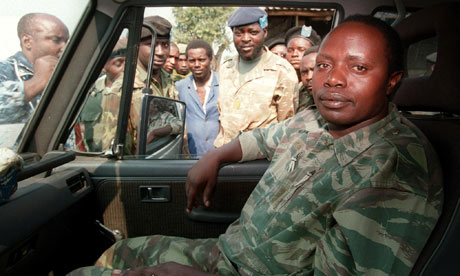 |
| "Augustin Bizimungu in 1994, the year of the Rwandan genocide. He prepared lists of Tutsis to be killed." (Vincent Amalvy/AFP/Getty Images) |
By David Smith
The Guardian, May 17, 2011
"Augustin Bizimungu, a former head of the army, and Augustin Ndindiliyimana, an ex-military police leader, were found guilty of genocide and crimes against humanity by the international criminal tribunal for Rwanda (ICTR) on Tuesday. Hutu militias carried out the mass slaughter of ethnic Tutsis and moderate Hutus between April and June 1994, triggered by the shooting down of a plane carrying President Juvenal Habyarimana. Bizimungu and Ndindiliyimana are two of the most senior figures to be sentenced by the ICTR, set up in Arusha in neighbouring Tanzania to prosecute the ringleaders. Bizimungu, 59, appeared unmoved when the judge ruled that, as army chief, he had complete control over the soldiers and militia who perpetrated the massacres. The 56-page indictment said he prepared lists of Tutsis to be 'exterminated,' referring to them as 'cockroaches' -- a term notoriously used by those behind the genocide. He failed to stop the rape and sexual abuse of women and girls. Bizimungu was a regular at the cocktail bar of the Mille Collines hotel when it gave refuge to hundreds of desperate people, a story told in the film Hotel Rwanda. Its manager, Paul Rusesabagina, plied him with drinks to keep him in check. 'I was with General Bizimungu and got him a drink,' Rusesabagina recalled in an interview with the Sunday Times in 2005. 'He then told one of his bodyguards, "Go up there and tell those boys that anyone who kills a person in this hotel, I will kill him -- anyone who fires even one shot, I will shoot him." I am not ashamed to say that I have shared a drink with General Bizimungu. If I had not, I could not have saved people. I had to.' The court on Tuesday dismissed Bizimungu's not guilty plea and sentenced him to 30 years in prison. Martin Ngoga, Rwanda's chief prosecutor, told Reuters: 'It is a welcome decision by the ICTR. In its own circumstances that is a big sentence, even if many people would think he deserved the highest.' The court ordered the release of Ndindiliyimana, given his command over the police was limited and because he had consistently supported reconciliation before 1994 and opposed the massacres. He had already spent 11 years in jail following his arrest in Belgium in 2000. [...]"














No comments:
Post a Comment
Please be constructive in your comments. - AJ